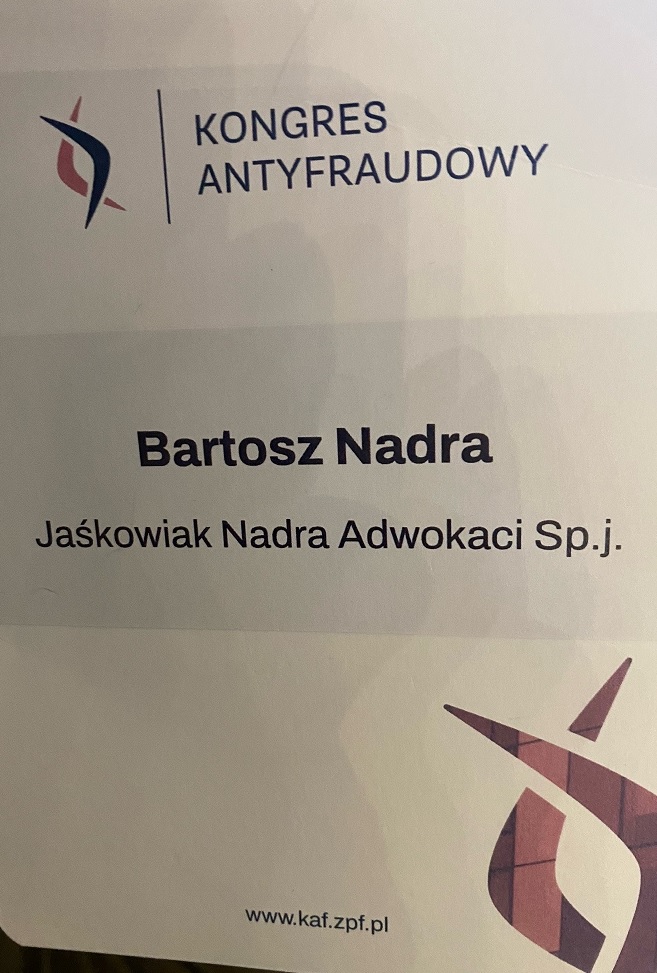The Anti-Fraud Congress organized by ZPF was held on 26/10/2022. The congress is aimed at the banking sector, leasing sector, insurance sector, SKOKs, telecoms and representatives of the non-banking lending sector. We, however, always look to it for knowledge in terms of fraud in the factoring industry, especially in online channels. In the article, a subjective account from the perspective of legal aspects for the financial industry, with emphasis on factoring. Full program available on the Congress website.
- Presentation of the results of the EY Poland - ZPF study (fraud in the financial sector). The first panel included a presentation of the results of the EY Poland - ZPF survey on fraud in the financial sector. The survey was conducted in the form of an anonymous questionnaire. Respondents include banks, lending institutions, leasing companies and insurance companies. Below are some insights:
- Whistleblowers - interesting statistics were presented on the number of reports and the channels by which they arrive. Fraud reporting systems are considered by respondents to be the most effective way of detecting irregularities, and a dedicated reporting e-mail is mainly used. On the other hand, reducing potential financial losses is considered the biggest benefit of implementing reporting systems. In terms of factoring - the assumption is that with large organizations, an employee who fears reprisals can report suspected fraud, including a fraud transaction.
- Fraudulent loan and similar products (loans, credits, leasing, factoring, etc.) remain the biggest threat to the business. Cyber attacks and falsification of reports and unauthorized transactions (banks) are less of a threat;
- Among the most effective methods of countering fraud in financial institutions are verification of customer data during sales decisions and activities undertaken by an independent internal team dedicated to detecting and combating irregularities. Customer verification and internal databases are important;
- The greatest hopes in solutions that can help fight fraud are associated by respondents with access to information / sector information sharing, IT solutions and legal changes;
- Regulatory review - co in the law makes it easier for criminals to carry out extortion, and what changes in the law are needed to counter them more effectively. In the course of this presentation, attention was paid in particular to foreigners as customers in the Polish financial market, their growth, and the risks associated with identifying and verifying the identity of the real beneficiary. The total number of foreigners who are clients of Polish banks in Q1 2022 is 1.7 million, with a year-on-year increase of 59.5%, which is related to the war across the eastern border, among other factors. The case of the fraudu on a forged passport from Finland was discussed.
- New data sources through the eyes of the provider. Let's talk about how it really is. Among the topics discussed during the firechat were: actual obstacles to data exchange in the financial and fintech market, trends, regulatory constraints and plans to change the market and regulator's approach.
- Fraud-as-a-Service - how are financial institutions finding their way in the new reality? The introductory presentation mentioned, among other things, the fraud business environment, the Cressey fraud triangle, the development of AI investments and market trends. The panel discussion was interesting, especially the thread about protecting the customer "from himself" and the scale of involvement of financial institutions (especially banks) in this regard. There was a topic of current frauds of recent months and years, including those spotted by the FSC, often thanks to the efforts of the ZBP (e.g., investment frauds - impersonation of companies like Orlen, alleged investments in Baltic Pipe, alleged investments to be authenticated by well-known persons such as R.Lewandowski, S.Holownia, etc.), aggressive ads pursuing users, grandchild method, pyramid structures, mules, identity verification of chat-line employees, bots, scam factories, stolen identities, etc. Subjects question consumers' ability to use the benefits of technology and where the line lies in trying to protect them from threats that they are aware of, but don't have the desire or time to read about (KNF alerts, banks, push-ups, threat lists, police press releases, etc.). Topics narrowly hooked into the b2b thread, although since the amendment of 1.01.2021 the status of the sole trader in bilateral professional relations, as we know it, has partially changed. Therefore, risks reaching into the b2b sector as well cannot be ruled out;
- Online fraud detection using digital identity technology and behavioral biometrics. The presentation discussed digital user identity, the fraud ecosystem, and the power of a global network of digital identities.
- Use of technology in countering fraud / countering and securing digital footprints. An interesting discussion with a large number of participants, trying to answer questions about the relationship between human ("protein factor") and electronic security and AI, trends in this area, socio-technical skills of perpetrators. There were also threads of risks associated with sensitive data processing, RODO, identity verification, behavioral biometrics.
- Fraud detection based on financial documents. Interesting discussion of traditional fraud, especially document fraud, how clients can defend themselves, and interesting cases (such as an attempt to lease an expensive watch along with a car).
Summary in terms of factoring: The topic of factoring came up directly at the Congress only once in terms of the amended provisions of the Banking Law (Article 106d of the Law), which, as of September 15, 2021, include factoring companies in the catalog of entities that can exchange information about extortion or suspected extortion with other financial participants. This allows factoring companies to exchange data with that of banks or loan companies. Besides, the topics concerned factoring in an indirect way, in terms of fraud threats related especially to online channels, forgery of identity documents, digital identity theft, etc. It is worth mentioning, however, that the whistleblower theme also applies to the factoring industry.
For event details and program, visit official Congress website.
See you next year.







